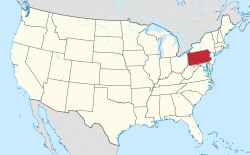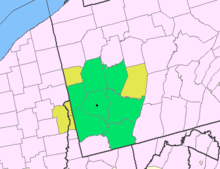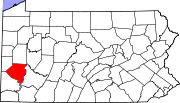Millvale, Pennsylvania
Millvale, Pennsylvania | |
|---|---|
 St. Nicholas Croatian Church in Millvale | |
 Location in Allegheny County and the U.S. state of Pennsylvania. | |
 Location of Pennsylvania in the United States | |
| Coordinates: 40°28′58.69″N 79°58′25.41″W / 40.4829694°N 79.9737250°WCoordinates: 40°28′58.69″N 79°58′25.41″W / 40.4829694°N 79.9737250°W | |
| Country | United States |
| State | Pennsylvania |
| County | Allegheny |
| Area | |
| • Total | 0.68 sq mi (1.75 km2) |
| • Land | 0.62 sq mi (1.60 km2) |
| • Water | 0.06 sq mi (0.15 km2) |
| Population (2010) | |
| • Total | 3,744 |
| • Estimate (2019)[2] | 3,662 |
| • Density | 5,925.57/sq mi (2,288.85/km2) |
| Time zone | UTC-5 (EST) |
| • Summer (DST) | UTC-4 (EDT) |
| ZIP code | 15209 |
| Area code(s) | 412 |
| FIPS code | 42-49920 |
| Website | www.millvalepa.com |
Millvale is a borough in Allegheny County, Pennsylvania, along the Allegheny River, opposite Pittsburgh, and off of Pennsylvania Route 28. The population was 3,744 at the 2010 census.[3]

Geography[]
Millvale is located at 40°28′59″N 79°58′25″W / 40.48306°N 79.97361°W (40.482968, -79.973725).[4]
According to the United States Census Bureau, the borough has a total area of 0.7 square miles (1.8 km2), of which 0.6 square miles (1.6 km2) is land and 0.1 square miles (0.26 km2), or 9.72%, is water.
Millvale is located at the confluence of Girtys Run and the Allegheny River. Much of the borough is on a floodplain and has been subjected to extensive flooding at many times during its history.
History[]
Millvale was formed around iron manufacturers, saw works, stone works, lumber mills, breweries, near the mouth of Girtys Run. In 1849, Herrs Island and the adjacent riverfront land of Reserve Township spanning from its northeastern boundary near Girtys Run downriver to Butcher's Run, the then-northeastern border of Allegheny City, were incorporated as the Borough of Duquesne (distinct from the modern borough of the same name). This Duquesne borough was disincorporated in 1868 and partitioned, the downriver portion being annexed to Allegheny City, while that part upriver of the northern end of Herrs Island was joined with adjacent lands to the north and east taken from Shaler Township to form the borough of Millvale.
Until 1952, the borough was served by the "3 Millvale" trolley operated by Pittsburgh Railways.[5]
Surrounding communities[]
Millvale has three land borders with Shaler Township from the northwest to east, the Pittsburgh neighborhood of Troy Hill to the southwest, and Reserve Township to the west. Across the Allegheny River, Millvale runs adjacent with Lower Lawrenceville and Central Lawrenceville. Millvale regularly collaborates with its northern riverside neighbors of Etna and Sharpsburg.
Taxes[]
School tax millage rate – The Shaler School District (shared with Shaler, Etna and Reserve Township) in 2017 was 23.28. This was ranked the 16th highest/most expensive out of Allegheny County's 45 school districts between Cornell SD (15th highest) and Riverview SD (17th highest).[6]
Demographics[]
| Historical population | |||
|---|---|---|---|
| Census | Pop. | %± | |
| 1870 | 668 | — | |
| 1880 | 1,824 | 173.1% | |
| 1890 | 3,809 | 108.8% | |
| 1900 | 6,736 | 76.8% | |
| 1910 | 7,861 | 16.7% | |
| 1920 | 8,031 | 2.2% | |
| 1930 | 8,166 | 1.7% | |
| 1940 | 7,811 | −4.3% | |
| 1950 | 7,287 | −6.7% | |
| 1960 | 6,624 | −9.1% | |
| 1970 | 5,815 | −12.2% | |
| 1980 | 4,772 | −17.9% | |
| 1990 | 4,341 | −9.0% | |
| 2000 | 4,028 | −7.2% | |
| 2010 | 3,744 | −7.1% | |
| 2019 (est.) | 3,662 | [2] | −2.2% |
| Sources:[7][8][9][10][11][12][13] | |||
As of the census[12] of 2000, there were 4,028 people, 1,839 households, and 959 families residing in the borough. The population density was 6,187.1 people per square mile (2,392.6/km2). There were 2,085 housing units at an average density of 3,202.6 per square mile (1,238.5/km2). The racial makeup of the borough was 97.00% White, 0.97% African American, 0.20% Native American, 0.17% Asian, 0.67% from other races, and 0.99% from two or more races. Hispanic or Latino of any race were 0.89% of the population.
There were 1,839 households, out of which 26.8% had children under the age of 18 living with them, 32.6% were married couples living together, 14.4% had a female householder with no husband present, and 47.8% were non-families. 41.6% of all households were made up of individuals, and 14.4% had someone living alone who was 65 years of age or older. The average household size was 2.16 and the average family size was 2.96.
In the borough, the population was spread out, with 23.5% under the age of 18, 9.9% from 18 to 24, 32.4% from 25 to 44, 19.7% from 45 to 64, and 14.5% who were 65 years of age or older. The median age was 36 years. For every 100 females, there were 95.6 males. For every 100 females age 18 and over, there were 93.6 males.
The median income for a household in the borough was $26,509, and the median income for a family was $30,478. Males had a median income of $27,624 versus $22,278 for females. The per capita income for the borough was $14,526. About 11.2% of families and 13.2% of the population were below the poverty line, including 15.3% of those under age 18 and 5.7% of those age 65 or over.
Culture[]
This section does not cite any sources. (April 2016) |
St. Nicholas Roman Catholic Church, on Maryland Avenue in Millvale, was the first Croatian parish in America.[14] Painted on the walls of the church are the world-renowned murals of Croatian artist Maksimilijan Vanka. These murals, painted in the 1930s and 1940s, were Vanka's gift to the United States.
Today, Millvale is home to a thriving bar and music scene. From craft breweries to the local family-owned "Cousin's" Bar, many different types of people of varied ages enjoy the night life in Millvale. One of Pittsburgh's most popular live music venues, Mr. Small's Theatre, regularly houses international acts of many different types of music. Punk, reggae, hardcore, rap/hip hop, country, and folk are some of the more popular genres present.
Government and politics[]
| Year | Republican | Democratic | Third Parties |
|---|---|---|---|
| 2016 | 40% 618 | 55% 853 | 6% 86 |
| 2012 | 39% 517 | 60% 795 | 1% 22 |
Recreation[]
Millvale Riverfront Park provides a 1.7 mile bike and walking trail that provides access from Millvale to Pittsburgh's North Shore, PNC Park, and Heinz Field along the Three Rivers Heritage Trail. The trail meanders along the Allegheny River, past Herrs Island, the TRRA Millvale Boathouse, and into the Millvale Riverfront Park. Plans for a bike/pedestrian bridge from the Millvale riverfront to Herrs Island has received partial funding from the DCNR and plans to connect the Millvale Trail to points north are being discussed. Access to the Millvale business district is less than half a mile away and restrooms are available. Other park amenities include a beautiful pavilion with riverfront access and a full kitchen, Mr. Smalls Skate Park, bike and boat rental, Millvale Marina, kayak and rowing boat launch access, fishing, a tackle and bait shop, and more. The Riverfront Park is also home to the wildly popular annual BrewFest in August and the newly launched, well-crafted Harvest Moon Wine Festival in the Fall.
Most recently, the Millvale Community Library has been launched as an all-volunteer effort of community members to take several vacant buildings and lots and turn them into a multi-use space centered on creating Millvale's first public library and associated garden space. This project was launched by community volunteers and Pittsburgh-based non-profit organization, New Sun Rising, in 2007 and has enlisted hundreds of volunteers to help turn this community dream into a reality.
References[]
- ^ "2019 U.S. Gazetteer Files". United States Census Bureau. Retrieved July 28, 2020.
- ^ Jump up to: a b "Population and Housing Unit Estimates". United States Census Bureau. May 24, 2020. Retrieved May 27, 2020.
- ^ "Race, Hispanic or Latino, Age, and Housing Occupancy: 2010 Census Redistricting Data (Public Law 94-171) Summary File (QT-PL), Millvale borough, Pennsylvania". United States Census Bureau. Retrieved September 21, 2011.
- ^ "US Gazetteer files: 2010, 2000, and 1990". United States Census Bureau. 2011-02-12. Retrieved 2011-04-23.
- ^ "Pittsburghtransit.com - The Routes - PCC Operation". August 28, 2005. Archived from the original on August 28, 2005. Retrieved August 9, 2009.
- ^ EL. "Allegheny County Treasurer". Retrieved 1 September 2017.
- ^ "Population of Civil Divisions Less than Counties" (PDF). 1880 United States Census. U.S. Census Bureau. Retrieved 24 November 2013.
- ^ "Population-Pennsylvania" (PDF). U.S. Census 1910. U.S. Census Bureau. Retrieved 22 November 2013.
- ^ "Number and Distribution of Inhabitants:Pennsylvania-Tennessee" (PDF). Fifteenth Census. U.S. Census Bureau.
- ^ "Number of Inhabitants: Pennsylvania" (PDF). 18th Census of the United States. U.S. Census Bureau. Retrieved 22 November 2013.
- ^ "Pennsylvania: Population and Housing Unit Counts" (PDF). U.S. Census Bureau. Retrieved 22 November 2013.
- ^ Jump up to: a b "U.S. Census website". United States Census Bureau. Retrieved 2008-01-31.
- ^ "Annual Estimates of the Resident Population". U.S. Census Bureau. Archived from the original on 20 November 2013. Retrieved 22 November 2013.
- ^ "US Board on Geographic Names". United States Geological Survey. 2007-10-25. Retrieved 2008-01-31.
- ^ EL. "2012 Allegheny County election". Pittsburgh Tribune-Review. Retrieved 15 October 2017.
- ^ EL. "2016 Pennsylvani general election..." Pittsburgh Post-Gazette. Retrieved 15 October 2017.
External links[]
- Populated places established in 1789
- Pittsburgh metropolitan area
- Boroughs in Allegheny County, Pennsylvania
- 1789 establishments in Pennsylvania


